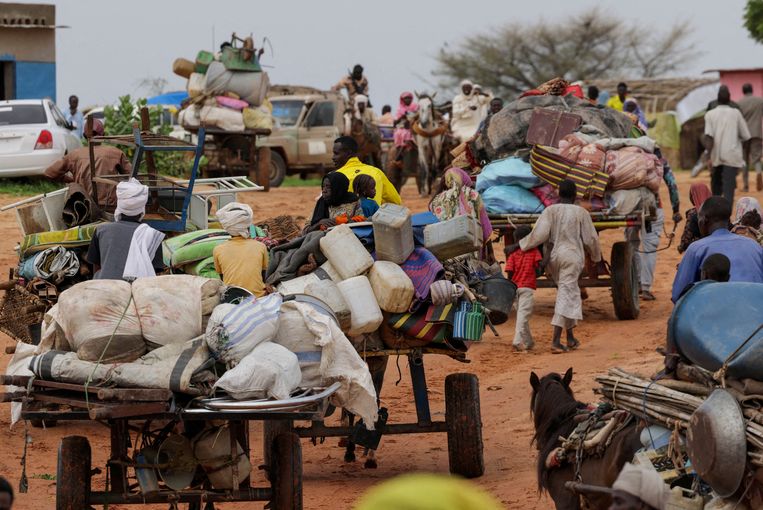The Sudanese city of El Geneina was the scene of a killing campaign against Masalit residents earlier this year. The scale became increasingly clear through testimonies collected by Human Rights Watch researcher Belkis Wille.
On the morning of June 14 to 15, one hundred thousand residents of the Sudanese city of El Geneina left at once. One humanitarian worker told Human Rights Watch that the mass exodus of the Masalit people “is the most heralded movement since the influx of people resulting from the Rwandan genocide.” The eyes of the international community are largely closed to all these atrocities. There is hardly any concrete evidence to open it.
To change that, Human Rights Watch researcher Belkis Wille, 36, traveled with her colleagues to refugee camps in neighboring Chad, on the border with Sudan. The researchers spoke to more than 170 Sudanese refugees from the West Darfur region to get a clear picture of what happened in the capital, El Geneina. The International Criminal Court is now also on site to record evidence. Human Rights Watch is expected to release its report early next year, but Willie is already talking about it.

Arab militias enjoy freedom of action
El Geneina is the ancient capital of the Dar Masalit Sultanate, which existed in the period between the nineteenth and twentieth centuries. The Masalit have been targeted by Arab Janjaweed militias since their uprising in the 1980s, but tensions go back centuries when the Arab population enslaved the African population. Since the Janjaweed Rapid Support Forces took control of the area during the war that broke out in Sudan in April, Arab militias have freedom of action.
The misery in El Geneina began immediately, when the Sudanese government armed forces withdrew to their base outside the city on April 24. The RSF and rival militias then repeatedly targeted the Masalit population. It continued like this for several months. Thousands of residents died. “By mid-June, most of the Masalit population had gathered in the streets surrounding the governor’s compound. “He had an armed security team there, and the people who flocked there hoped they would be safe there,” says Willie. “The governor himself was executed in June 14.”
The next day, the Rapid Support Forces took full control of the city. “The Masalit leaders decided the only option was to leave,” Willie says. “The hospitals were evacuated, and the convoy left at ten in the evening.” The exact number is unclear, but it is believed that more than 100,000 people headed towards the SAF base in nearby Ardamata.
“The road is full of corpses”
Initially the procession was protected by armed vehicles, but early in the morning things worsened and people were separated. RSF soldiers and militiamen were already lined up along the road, and the massacre began. “Many people jumped into the parallel river in panic. Many drowned, and others continued to be shot as they tried to reach the other side. Others tried to escape but were also shot dead,” Willie explains. “The scale of the mass killings in this “Today is truly unimaginable.”
Many victims were unable to reach Ardamata and turned back towards the border with Chad. The thirty-kilometre road between El Geneina and the border was littered with corpses the next day. In one night, tens of thousands of refugees arrived at Adre refugee camp, on the other side of the border. People who fled to Ardamata were forced to flee for their lives again at the beginning of this month after a new attack. About 1,200 people died this time.
Willie interviewed several children with gunshot wounds at the MSF hospital in the refugee camp, the youngest of whom was seven years old. Willie: “The firefighters did not hit them, but they were looked directly in the eyes as a militia member pulled the trigger. “What happened is truly terrible, but it has not caused global outrage.”

One of the people they interviewed, a 17-year-old boy, witnessed the massacre up close on June 15. “At the beginning of the war, he was shot twice in the hip while taking shelter with his family in the mosque. This made him unable to walk, so his mother pushed him into a wheelbarrow. When the shooting started, she had to leave him behind and he remained lying helpless in the wheelbarrow in the middle of “He saw many parents and their young children, who could not escape quickly enough, being herded together. The parents and children were separated, after which both groups were shot dead.”
When Willie speaks of another testimony – of a murdered boy and his mother who searched for her dead son to find him – her eyes fill with tears. The researcher, who went through a lot in Iraq, Afghanistan and elsewhere, was deeply influenced by her experience in Chad.
For a moment there seemed to be a small point of light at the end of this black tunnel. The UN Security Council is scheduled to vote on the mandate of the United Nations mission in Sudan. According to Weil, this mandate was never sufficient, but if expanded, the mission could play a role in protecting residents. However, the Sudanese government itself decided to cancel the mission completely. Willie is clear: “Our greatest concern is that we need to protect civilians in Darfur at this time.”

“Creator. Award-winning problem solver. Music evangelist. Incurable introvert.”







More Stories
British military spy satellite launched – Business AM
Alarming decline in the Caspian Sea
Lithuania begins construction of military base for German forces